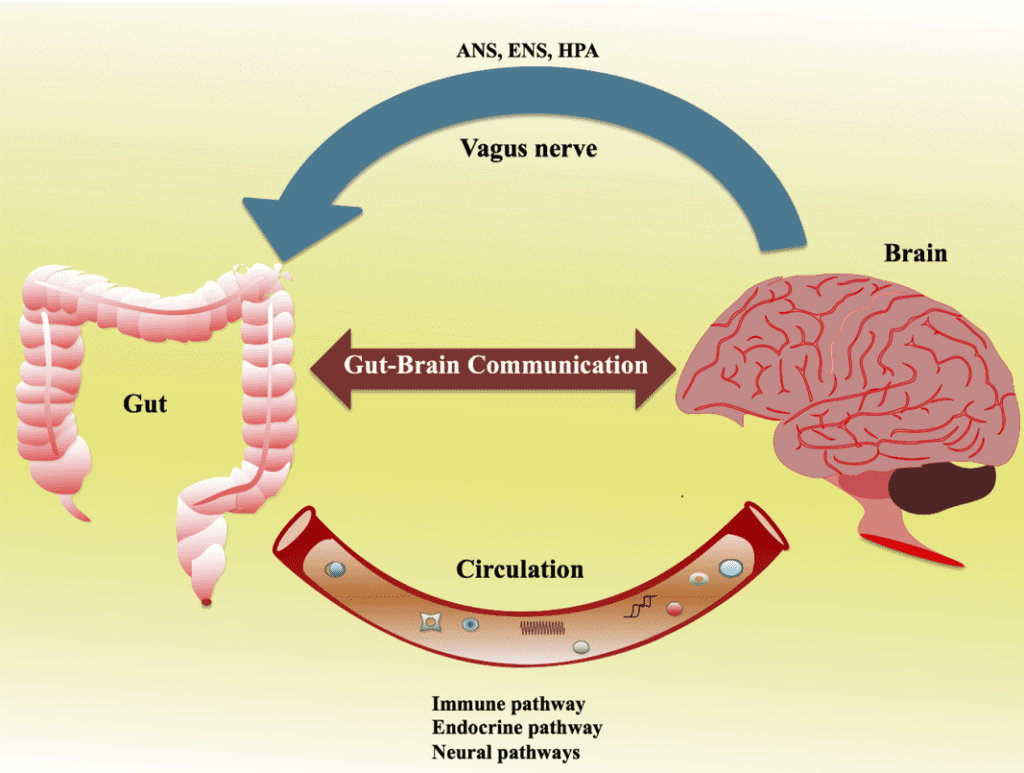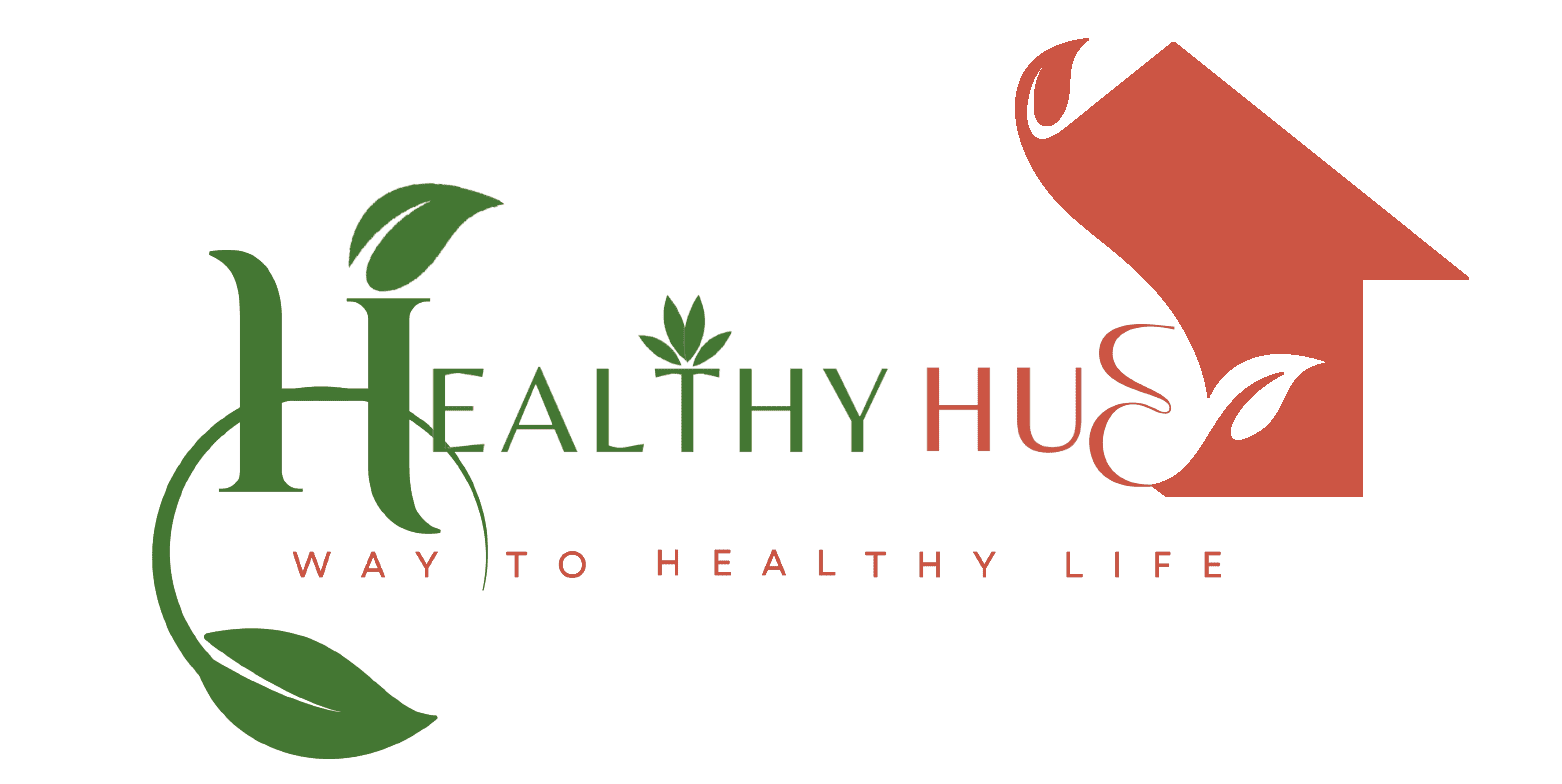Have you ever felt butterflies in your stomach before a big event? Or noticed digestive issues when you’re stressed, anxious, or overwhelmed? You’re not alone — and it’s not just in your head.
In recent years, scientists and healthcare professionals have uncovered a fascinating link between gut health and mental health. This bidirectional communication between the two is known as the gut brain connection, and it plays a vital role in everything from mood regulation and stress response to cognitive function and emotional well-being.
Let’s dive into how the gut and brain communicate, what it means for your mental health, and what you can do to support both.

🤝 What Is the Gut Brain Axis?
The gut brain axis refers to the two-way communication system between your gastrointestinal tract and your central nervous system. This includes physical, hormonal, and biochemical signals that travel through the vagus nerve, bloodstream, and immune system.
At the heart of this connection lies the Enteric Nervous System (ENS) — often referred to as the “second brain.” Unlike the brain in your skull, the ENS doesn’t help you think or remember things. Instead, it governs the complex movement of food, the release of digestive enzymes, and communicates closely with your brain through chemical signals.
This second brain is embedded in the walls of the gut and contains more than 100 million nerve cells, stretching from the esophagus to the rectum. It’s a key player in maintaining gut function — but its influence goes far beyond digestion.
🧠 How the Gut Affects Mental Health
Your gut can actually impact your mood, emotional state, and susceptibility to mental health disorders like depression and anxiety. This influence happens through multiple mechanisms:
1. Gut Microbiome & Mood
The gut microbiome is a bustling ecosystem of trillions of bacteria, fungi, and other microbes that live in your intestines. These microorganisms produce essential neurotransmitters, like:
- Serotonin (the “feel-good” hormone) – over 90% is made in the gut!
- Dopamine – associated with motivation and reward
- GABA – helps control anxiety and stress
When your gut bacteria are imbalanced (a condition called dysbiosis), it can negatively impact the production of these mood-regulating chemicals, which may increase the risk of mental health issues.
2. Stress Hormones & Gut Function
Chronic stress doesn’t just affect the mind — it can disturb the gut too. The hormone cortisol, released during stress, affects how your gut digests food and absorbs nutrients. It can also influence gut permeability, leading to “leaky gut,” which has been linked to both inflammation and mental health conditions.
Studies in the UK and globally have shown that stress-related gut issues like Irritable Bowel Syndrome (IBS) often co-exist with anxiety or depression, reinforcing the gut-brain loop.

🧠 How the Gut Affects Mental Health
Your gut can actually impact your mood, emotional state, and susceptibility to mental health disorders like depression and anxiety. This influence happens through multiple mechanisms:
1. Gut Microbiome & Mood
The gut microbiome is a bustling ecosystem of trillions of bacteria, fungi, and other microbes that live in your intestines. These microorganisms produce essential neurotransmitters, like:
- Serotonin (the “feel-good” hormone) – over 90% is made in the gut!
- Dopamine – associated with motivation and reward
- GABA – helps control anxiety and stress
When your gut bacteria are imbalanced (a condition called dysbiosis), it can negatively impact the production of these mood-regulating chemicals, which may increase the risk of mental health issues.
2. Stress Hormones & Gut Function
Chronic stress doesn’t just affect the mind — it can disturb the gut too. The hormone cortisol, released during stress, affects how your gut digests food and absorbs nutrients. It can also influence gut permeability, leading to “leaky gut,” which has been linked to both inflammation and mental health conditions.
Studies in the UK and globally have shown that stress-related gut issues like Irritable Bowel Syndrome (IBS) often co-exist with anxiety or depression, reinforcing the gut-brain loop.

🧪 Psychobiotics: The Probiotic-Mental Health Link
Here’s where it gets really interesting. Scientists have begun to explore a class of probiotics known as psychobiotics — live bacteria that have mental health benefits.
One well-known strain is Bifidobacterium longum, which research suggests can reduce anxiety symptoms in people with IBS. Another helpful probiotic, Lactobacillus rhamnosus, has shown promise in reducing stress and improving mood.
🥦 What About Prebiotics?
Prebiotics are dietary fibres that nourish your good gut bacteria. One such example is Galacto-oligosaccharides (GOS) — found in foods like lentils, chickpeas, and some whole grains. Studies show that GOS can reduce cortisol levels and lower stress.
Together, probiotics and prebiotics can support a healthy gut-brain axis, enhance your mental clarity, and even improve sleep.
🚨 Gut Disorders & Mental Health: A Two-Way Street
It’s not just the gut affecting the brain — the brain can influence the gut too. Mental health conditions can worsen gut disorders, and gut issues can trigger psychological distress.
Conditions like:
- Irritable Bowel Syndrome (IBS)
- Crohn’s Disease
- Ulcerative Colitis
are often associated with increased levels of anxiety, stress, and depression. That’s why doctors sometimes use psychological therapies — like CBT (Cognitive Behavioural Therapy) or gut-directed hypnotherapy — to treat digestive disorders.
✅ How to Support a Healthy Gut-Brain Connection
Improving your gut health doesn’t just help your digestion — it can lead to a more stable mood, better sleep, and lower stress levels. Here are some UK-friendly wellness tips:
🥗 Eat More Fermented Foods
Include natural sources of probiotics such as:
- Yogurt (with live cultures)
- Sauerkraut
- Kimchi
- Kefir
- Miso
- Kombucha
Feed Your Good Bacteria
Consume prebiotic-rich foods like:
- Oats
- Bananas
- Onions
- Garlic
- Lentils
- Chicory root
🚶♀️ Manage Stress Regularly
- Practice mindfulness and meditation
- Engage in light exercise (walking, swimming, yoga)
- Get 7–8 hours of quality sleep
💧 Stay Hydrated
Water is essential for healthy digestion and supports microbial balance.
⛔ Limit Gut Disruptors
Avoid:
- Excessive antibiotics (unless prescribed)
- Processed foods
- High sugar and artificial sweeteners
- Chronic stress and sleep deprivation
🧠 Final Thoughts: A Healthy Gut Means a Healthier Mind
The gut brain connection is not just a buzzword — it’s a scientifically backed relationship that reveals how deeply connected our physical and mental health truly are. By taking simple steps to nourish your gut, you can also boost your mood, reduce anxiety, and enhance your overall mental wellness.
Stay connected with Healthy Hub UK as we continue exploring natural, science-based ways to improve your gut and mental health.
💬 What’s Next?
We’ll be sharing specific meal plans, supplements, and lifestyle hacks to heal your gut naturally and enhance mental clarity. Stay tuned!
